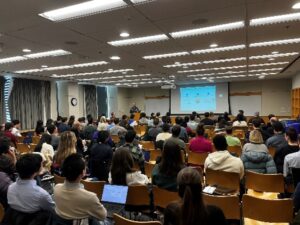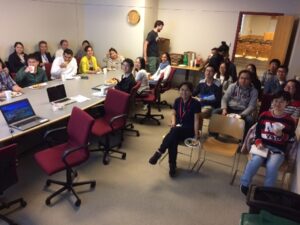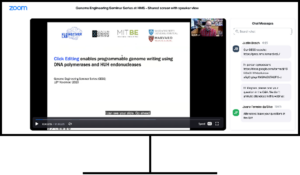Advances in genome engineering are of broad interest (e.g., 2020 Nobel Prize in Chemistry); however, since they occur at a rapid pace, it’s difficult for scientists to stay up to date. Attending conferences is crucial for learning about cutting-edge advances, but accessibility barriers such as travel and registration costs exist. Additionally, while principal investigators are typically invited to give talks, the first author scientists who carry out the research are better suited to answer technical questions and would greatly benefit from presenting their work.

On November 30, 2023, Harvard Medical School hosted a hybrid symposium on recent advances in genome engineering, organized by three postdoctoral researchers: Justin Bosch, University of Utah; Joana Ferreira Da Silva, Massachusetts General Hospital and Harvard Medical School; and Raghuvir Viswanatha, Harvard Medical School. Sponsored by a GSA Starter Culture Microgrant, this event brought together Boston-area scientists and virtual attendees to update them on recent genome engineering tools, to give early career scientists and first authors an opportunity to present their research, and to make these talks available free of charge to a worldwide audience.
The symposium featured keynote speakers Benjamin Kleinstiver, Massachusetts General Hospital and Harvard Medical School, and Julia Joung, Whitehead Institute, along with presentations from nine PhD students and postdocs on their recently published work. The symposium was highly successful with approximately 200 in-person attendees, 385 virtual attendees, and more than 800 views of the recording across the globe. Positive feedback from attendees focused on the lack of fees, availability of a recording for those in distant time zones, and advertising through GSA. Critical feedback centered on a perceived preference for in-person attendee questions over virtual.

This symposium was the culmination of five years of grassroots efforts by Boston-area scientists to stay on top of cutting-edge genome engineering techniques. Originally organized as an in-person journal club at Harvard Medical School, the virtual Genome Engineering Seminar Series (GESS) was created to mitigate COVID-19 social distancing policies. GESS is a free weekly seminar in which first authors present their recent paper or manuscript live over Zoom. Running since 2021, GESS has had more than 100 speakers and over 3,000 cumulative attendees from more than 51 countries.
Additionally, GESS provides leadership opportunities for early career scientists as seminar organizers. The program was initially established by Justin Bosch and Tracy Zhang, and the current GESS organizers are Ferreira Da Silva, Viswanatha, Hassan Bukhari, and Nouraiz Ahmed.

By hosting the symposium both in person and via Zoom, we eliminated most expenses typically associated with registration and travel for attendees. Given Boston’s concentration of groups involved in the development of genome engineering methods, it was practical to extend invitations to local experts to present in person. Therefore, our symposium format greatly reduces barriers for scientists to both present and attend. We hope to make this symposium an annual event with its hybrid format serving as a model for other research areas.
You can learn more about GSA’s Starter Culture Microgrant Program on the GSA website. Applications for microgrants are accepted on a quarterly basis.



